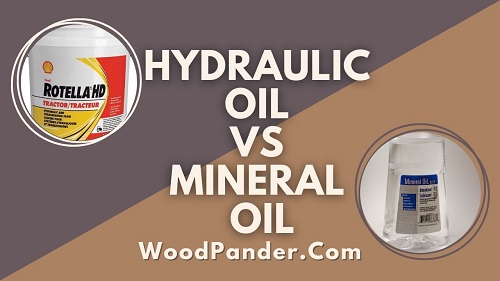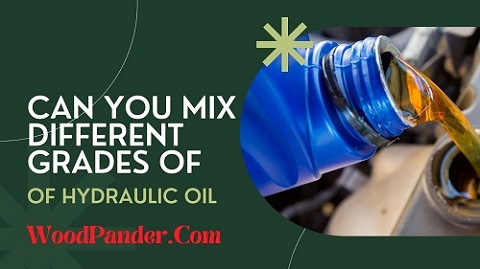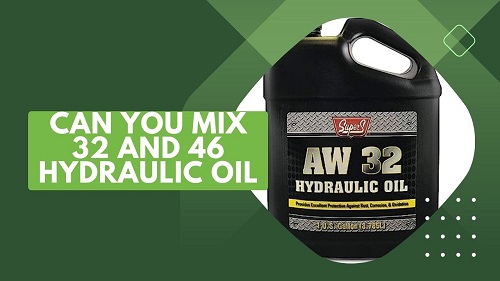Log splitters are essential tools for efficiently splitting logs, making them an invaluable asset for homeowners, firewood suppliers, and professionals in the forestry industry.
One crucial component that ensures the smooth operation of log splitters is hydraulic oil. Hydraulic oil plays a vital role in providing the necessary power and lubrication for the hydraulic system of log splitters.
In this article, we will explore the importance of choosing the right hydraulic oil for log splitters and provide valuable insights on how to make the best selection.
Hydraulic Oil for Log Splitter (Difference)
| Hydraulic Oil Type | Pros | Cons | Recommended for |
|---|---|---|---|
| AW32 | Good viscosity range | Limited temperature range | Light-duty log splitters |
| AW46 | Wide temperature range | Higher cost | Medium to heavy-duty splitters |
| AW68 | Excellent high-temperature | Poor low-temperature | Heavy-duty commercial splitters |
| Universal | Versatile, all-season use | May lack specialized | All-purpose log splitter oil |
One of our articles –Can You Use Brake Fluid in Hydraulic Jack?
Understanding Hydraulic Oil
| Hydraulic Oil Type | Synthetic Hydraulic Oil | Biodegradable Hydraulic Oil | Conventional Hydraulic Oil |
|---|---|---|---|
| Base Oil | Synthetic base oils | Biodegradable base oils | Mineral base oils |
| Viscosity Range | ISO VG 32-46 | ISO VG 32-46 | ISO VG 32-46 |
| Performance Benefits | – Improved viscosity index stability – Better resistance to oxidation – Enhanced lubricity – Extended service life | – Environmentally friendly – Non-toxic – Excellent lubrication properties – Compatible with most log splitter components | – Cost-effective option – Widely available – Suitable for standard log splitter operations |
| Environmental Impact | Low | Low | Moderate |
| Operating Conditions | Extreme temperatures | Wide range of temperatures | Moderate temperatures |
| Manufacturer’s Approval | Dependent on log splitter model and recommendations | Dependent on log splitter model and recommendations | Dependent on log splitter model and recommendations |
| Compatibility | Compatible with most log splitter components | Compatible with most log splitter components | Compatible with most log splitter components |
| Recommended Usage | Log splitters operating in extreme temperature conditions or high-temperature environments | Environmentally conscious users | Standard log splitter operations |
| Availability | Widely available | Widely available | Widely available |
Hydraulic oil is a specially formulated fluid designed to transmit power within hydraulic systems.
In log splitters, hydraulic oil serves multiple purposes.
Firstly, it acts as a medium to transfer pressure, allowing the hydraulic system to generate the force needed to split logs effectively.
Secondly, hydraulic oil provides lubrication to the various moving parts of the log splitter, reducing friction and preventing wear and tear.
Additionally, hydraulic oil acts as a coolant, dissipating heat generated during the operation of the log splitter.
To ensure optimum performance and longevity of log splitters, it is crucial to understand the key properties and characteristics of hydraulic oil. Viscosity, additives, and compatibility with log splitter components are among the critical factors to consider when selecting the appropriate hydraulic oil.
One of our articles –Can I Use Power Steering Fluid For Hydraulic Jack?
Choosing the Right Hydraulic Oil for Log Splitters
Selecting the correct hydraulic oil is paramount for maintaining the performance and efficiency of log splitters. Several factors need to be considered when making this decision.
Viscosity Requirements
Viscosity refers to the thickness or resistance to flow of hydraulic oil.
It is denoted by the ISO VG (Viscosity Grade) rating. Log splitters typically require hydraulic oils with a viscosity grade between ISO VG 32 and ISO VG 46, depending on the specific model and manufacturer’s recommendations.
Using hydraulic oil with the wrong viscosity can lead to inadequate lubrication, decreased performance, and potential damage to the log splitter.
Additive Requirements
Certain additives are often blended with hydraulic oil to enhance its performance and protect log splitter components.
These additives may include anti-wear agents, corrosion inhibitors, and anti-foaming agents.
Check the log splitter’s manual or consult the manufacturer to determine any specific additive requirements.
Compatibility with Log Splitter Components
Different log splitters may have specific requirements regarding hydraulic oil compatibility.
It is essential to ensure that the hydraulic oil selected is compatible with the seals, hoses, and other components of your log splitter.
Using incompatible hydraulic oil may cause leaks, seal deterioration, or other damage to the hydraulic system.
Recommended Hydraulic Oils for Log Splitters
Several types of hydraulic oils are suitable for use in log splitters.
The choice depends on factors such as environmental considerations, operating conditions, and manufacturer recommendations. Here are some common types of hydraulic oils used in log splitters:
Synthetic Hydraulic Oils
Synthetic hydraulic oils offer several advantages, including improved viscosity index stability, better resistance to oxidation, and enhanced lubricity.
They perform well under extreme temperature conditions and provide extended service life. Synthetic hydraulic oils are especially beneficial for log splitters operating in cold climates or high-temperature environments.
Biodegradable Hydraulic Oils
For environmentally conscious users, biodegradable hydraulic oils are a viable option. These oils are formulated using biodegradable and non-toxic base oils, making them safer for the environment.
Biodegradable hydraulic oils offer excellent lubrication properties and are typically compatible with most log splitter components.
When selecting the hydraulic oil for your log splitter, consider the specific requirements of your equipment, including operating temperatures, environmental impact, and the manufacturer’s recommendations.
Steps to Change Hydraulic Oil in a Log Splitter
Regular maintenance of hydraulic oil is crucial for optimal log splitter performance. Over time, hydraulic oil can become contaminated with debris, water, or other impurities, compromising its effectiveness. Here are the steps to change the hydraulic oil in your log splitter:
- Step 1: Preparation
- Ensure the log splitter is turned off and parked on a level surface.
- Gather the necessary tools and equipment, including a drain pan, a wrench, and the appropriate replacement hydraulic oil.
- Step 2: Draining the Old Oil
- Locate the drain plug on the hydraulic reservoir.
- Place the drain pan beneath the drain plug.
- Loosen the drain plug using a wrench, allowing the old oil to drain completely.
- Step 3: Removing the Hydraulic Filter (if applicable)
- If your log splitter has a replaceable hydraulic filter, remove it carefully, following the manufacturer’s instructions.
- Inspect the filter for any signs of damage or excessive contamination. Replace it if necessary.
- Step 4: Adding New Hydraulic Oil
- Close the drain plug securely after the old oil has drained.
- Refer to the log splitter’s manual or manufacturer’s recommendations to determine the correct type and quantity of hydraulic oil.
- Slowly pour the new hydraulic oil into the reservoir, avoiding spills or overfilling.
- Step 5: Checking Oil Levels
- Start the log splitter’s engine and let it run for a few minutes.
- Check the hydraulic oil level using the dipstick or sight gauge, ensuring it falls within the recommended range.
- If necessary, add more hydraulic oil to achieve the proper level.
Maintaining Hydraulic Oil in Log Splitters
Regular maintenance is crucial for ensuring the longevity and efficient operation of hydraulic oil in log splitters. Here are some essential maintenance tasks:
Checking Hydraulic Oil Levels
Regularly inspect the hydraulic oil levels to ensure they are within the recommended range. Low oil levels can result in poor performance and potential damage to log splitter components. If the oil level is low, add the appropriate hydraulic oil to maintain the correct level.
Monitoring Oil Quality and Condition
Inspect the hydraulic oil regularly for any signs of contamination, such as water or debris. Contaminated oil can lead to reduced performance and damage to the log splitter’s hydraulic system. If the oil appears milky, contains particles, or has an off-putting odor, it may indicate contamination. In such cases, drain and replace the hydraulic oil.
Proper Storage and Disposal of Used Hydraulic Oil
When changing hydraulic oil, it is essential to handle the used oil responsibly. Collect the used oil in a suitable container and dispose of it according to local regulations.
Many service centers and recycling facilities accept used hydraulic oil for proper disposal or recycling. Avoid pouring used oil into drains, soil, or water sources, as it can harm the environment.
Troubleshooting Hydraulic Oil Issues
Sometimes log splitters may experience issues related to hydraulic oil. Here are a few common problems and potential solutions:
- Leaking Hydraulic Oil
- Check for loose connections or damaged seals and hoses. Tighten connections or replace faulty components as needed.
- Ensure the hydraulic oil is compatible with the log splitter’s components.
- Foaming or Air in Hydraulic Oil
- Foaming may indicate the presence of air in the hydraulic system. Check for leaks and ensure the system is properly bled.
- Verify that the hydraulic oil level is correct and within the recommended range.
- Excessive Heat in Hydraulic Oil
- Overheating hydraulic oil can lead to reduced performance and potential damage. Check for proper cooling and ventilation of the log splitter.
- Ensure the hydraulic oil is the correct viscosity for the operating conditions.
If troubleshooting efforts do not resolve the issue, it is advisable to seek professional assistance from a qualified technician or log splitter service center.
Benefits of Using the Correct Hydraulic Oil
Using the correct hydraulic oil in your log splitter provides numerous benefits:
- Improved Performance and Efficiency: The right hydraulic oil ensures optimal operation, enhancing the log splitter’s performance and efficiency.
- Extended Lifespan of Log Splitter Components: Proper lubrication and protection provided by hydraulic oil help reduce wear and tear on log splitter components, extending their lifespan.
- Enhanced Safety During Operation: Reliable hydraulic oil ensures smooth and controlled operation, reducing the risk of accidents and equipment malfunctions.
Related Questions
What happens if I use the wrong hydraulic oil in my log splitter?
Using the wrong hydraulic oil can lead to poor performance, decreased efficiency, and potential damage to log splitter components. It is essential to follow the manufacturer’s recommendations to avoid any adverse effects.
Can I mix different types of hydraulic oil in my log splitter?
It is generally not recommended to mix different types of hydraulic oil unless specified by the manufacturer. Mixing oils with different properties may result in reduced performance and potential damage to the hydraulic system.
How often should I change the hydraulic oil in my log splitter?
The frequency of oil changes depends on various factors such as usage, operating conditions, and manufacturer recommendations. As a general guideline, it is advisable to change the hydraulic oil at least once a year or after every 100 hours of operation.
Can I reuse or recycle used hydraulic oil from my log splitter?
Used hydraulic oil can be recycled or reprocessed by specialized facilities. Check with local recycling centers or waste management authorities for proper disposal or recycling options. Avoid disposing of used oil inappropriately, as it can harm the environment.
Are there any eco-friendly options for hydraulic oil in log splitters?
Yes, there are eco-friendly options available, such as biodegradable hydraulic oils. These oils are formulated using biodegradable base oils and have minimal environmental impact. They provide effective lubrication and can be a suitable choice for environmentally conscious users.
Conclusion
Selecting the appropriate hydraulic oil for your log splitter is crucial for its performance, efficiency, and longevity.
Consider factors such as viscosity requirements, additive needs, and compatibility with log splitter components. Regularly maintain the hydraulic oil by monitoring its levels, inspecting its quality, and following proper storage and disposal practices.
By taking these steps, you can ensure optimal log splitter performance and enjoy the benefits of a well-maintained hydraulic system.








